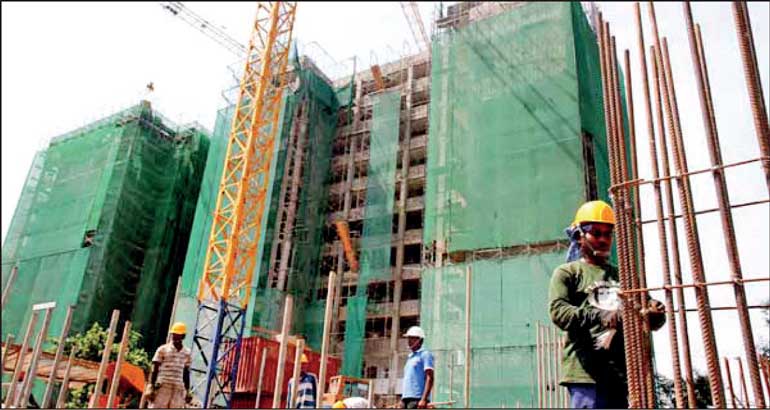Tuesday Feb 17, 2026
Tuesday Feb 17, 2026
Wednesday, 8 November 2023 00:25 - - {{hitsCtrl.values.hits}}

Due to construction companies not having much work in hand over, 200,000 have lost employment
 Due to many events in the past, such as the Easter Sunday bomb blasts, the lasting impacts of the COVID-19 pandemic and the unprecedented economic crisis that crippled Sri Lanka, the construction industry suffered repeated contractions from March 2020 to date. As a result, the construction industry, which is one of the primary contributors to the Sri Lankan economy that used to contribute between 8-9% to the GDP, has faced significant difficulties making it impossible for the companies involved in construction to continue with business operations.
Due to many events in the past, such as the Easter Sunday bomb blasts, the lasting impacts of the COVID-19 pandemic and the unprecedented economic crisis that crippled Sri Lanka, the construction industry suffered repeated contractions from March 2020 to date. As a result, the construction industry, which is one of the primary contributors to the Sri Lankan economy that used to contribute between 8-9% to the GDP, has faced significant difficulties making it impossible for the companies involved in construction to continue with business operations.
This has forced several companies either to suspend operations or shutdown. In turn this has affected nearly 1.2 million who were engaged either directly or indirectly in this sector and already over 200,000 have lost employment. It is important to note that over 20% of our population are dependent on this industry.
In this backdrop, the Chamber of Construction Industry of Sri Lanka, as the apex representative body of all stakeholders of the construction industry, has submitted the following proposals to be considered in the Budget 2024 for the revival of this vital industry.
Some of these proposals were included in the report of the Committee, appointed by President Ranil Wickremesinghe with Chief of Staff Sagala Ratnayake in the chair, finalised earlier for the revival of the construction industry. Full implementation of all these proposals will be of paramount importance if the construction industry is to be revived from the deep abyss it has fallen into.
1) Restart whatever possible donor funded projects out of the nearly 100 projects affected with a total cost of $ 3.0 billion and also locally funded projects that were suspended after reaching 70% completion. Other locally funded projects to be considered to restart on a priority basis.
2) Introducing the scheme discussed a few years back of housing loans to 1st time home builders at a concessionary interest rate of about 5-6% with a payback period of 40 years. (2 generation loans as in some Western countries)
3) Housing Loan interest component to be considered as an allowable reduction on assessable income for income tax (if it is not claimable at the moment)
4) Property Development projects should be exempted from VAT as otherwise it will become a cost to the buyers further increasing the already high property values.
5) Implement the Golden Paradise Visa with a lower threshold of $ 100,000, paid through a bank to invest on an apartment, allowing five-year residency.
6) Establish a Development Bank with stakes given to other willing banks also. This Development Bank in addition to supporting new development projects should also introduce a suitable mechanism to complete the building projects partly done but unable to proceed due to recession, price escalations and other contractual issues but are still commercially viable.
7) Implement the proposal of the Presidential Commission on Simplifying Existing Laws and Regulations (PCSELR) submitted in June 2021 to appoint a statutory committee by amending the UDA Act to ensure the issue Development Permits within a definite time limit of 28 days. As a lasting solution develop a fully online system to submit applications and grant approval, by checking online the compatibility with the planning requirements, as in Singapore.
8) Adopt PPP model to develop state lands, based on income sharing at the time of sale of developed units based on an agreed formula, rather than requesting land value upfront.
9) Introduce a regulation for banks to monitor the financial management in property development projects through a dedicated escrow account per project, to ensure that the advances collected from the buyers are invested in the particular project
10) As an alternative to the capital investments by Government on development projects, it is proposed to establish a mechanism to obtain funding from the private sector through consortia of contractors facilitated through CCI using long term bonds for about 15-30 years. This model has several benefits as given below:
(i) Since contractors are also infusing funds, they will try to complete projects on time.
(ii) Cost will be lower since the consortium will have several contractors and with any cost escalation the contractor’s contribution will also increase.
(iii) The Government should consider raising capital through the capital market and establish a framework for this mode of development.
The Government could get ADB/WB assistance to develop a suitable framework to ensure transparency and to minimise the cost.
As the bonds will be listed and rated, investments will require full disclosure and as such it is a transparent process.
11) For all Government projects appointment of consultants shall be based on competitive bids with a 2-envelope system as per the Government Procurement Guidelines. Consultancy contracts on construction projects should not be awarded to the universities or any units formed by them.
12) In construction contracts very often, there are delays on receiving payments for work done. To mitigate this to some extent, allow taxes including VAT in the construction industry to be computed on cash received basis as opposed to accrued basis. In the past this was allowed to construction (contracting and consultancy) companies.
13) Revise CIDA standard bidding documents to allow compensation for late payments at 3% above the bank rate of CBSL to bring in line with international FIDIC documents and prevailing commercial bank lending rates.
14) To encourage export of construction materials produced in excess of local demand such exports to be exempted from CESS.
15) The demand for crushed aggregates and sand has dropped by over 50% thus threatening the livelihoods of workers who were engaged in quarrying these. To mitigate, allow export of these items until the construction industry is back to normal level.
16) Currently our unit construction cost is the highest in South Asia due to the high cost of raw materials and energy. To mitigate remove/reduce duty on raw materials imported for the manufacture of cement, reinforcement and structural steel, roofing, wooden and aluminium products plumbing and electrical items, paints and building fixtures.
17) Medium term consistency in taxation policies for construction materials and supplies avoiding overnight changes to duty regime.
18) All contracts for construction over three months duration should have the provision to reimburse price escalations due to price volatility that prevailed.
19) On imports of construction materials needed for project implementation, VAT will be charged on 100% of CIF value as opposed to 110% of CIF value prevailing now.
20) Appoint a high-powered Steering Committee under the President to meet monthly to monitor the status of Government projects and settle any issues.
21) Either establish a Minister of Public Works as in the period prior to 1970 or make construction a specific ministry subject and construction work of all Ministries and State Institutions without a strong engineering base shall be brought under the purview of this Ministry. This will facilitate reduction of a lot of waste and unnecessary expenditure.
22) Due to construction companies not having much work in hand over, 200,000 have lost employment. Many of these workers are seeking to go abroad and others will get into other possible sectors. Eventually when the economy turns around leading to an increased construction demand we will have a severe shortage of skilled construction labour. Even in the past school leavers were not mostly willing to undergo skills training in construction. It appears that the stipend that was given for vocational training has been suspended now. What is required for training in construction training is to give an increased stipend of about Rs. 1,000 per day rather than suspending. The training curricula should be changed to include in plant training at worksites of CIDA registered companies capable of guiding the trainees.
23) Construction industry has undergone contractions continuously from 2020 to date. Due to unprecedented financial problems faced by construction companies and property developers, banks should be directed not to resort to Parate Execution until Dec 2024 when the Construction Industry is expected to turn around.
24) Export of construction services is hampered due to the non-acceptance of US$ guarantees issued by our banks to overseas clients awarding contracts. To remedy this, arrange a counter guarantee facility with an international donor so that our commercial banks can use this facility.
25) For our companies to undertake projects in many countries, require formation of subsidiary companies in those countries with a share to a national of the country concerned. At present our companies can get guarantees only up to $ 1.0 million to such subsidiary companies, as per Central Bank Direction No. 20 of 2021. This should be increased up to at least $ 10.0 million considering the size of projects available.
26) In some countries the clients require our companies to deposit about 10% in the project as a show of commitment to award the construction contract. This is refunded on completion of contract. This was allowed earlier but was disallowed by Gazette No. 2286/27 dated 30 June 2022, extended again in June 2023, issued under Foreign Exchange Act, No. 12 of 2017.
27) Due to repeated contractions suffered by the construction industry since 2020 to date, most of our companies are unable to furnish security to banks to obtain the guarantees in the high values needed to execute overseas contracts. As such a special scheme to be introduced to select 20 CIDA registered companies who have performed well, in consultation with CIDA and the Chamber of Construction Industry, and issue guarantees backed by CBSL on a nil margin with the condition that each company will sub contract to two other local CIDA registered companies.
(The writer is the Secretary General/CEO at Chamber of Construction Industry of Sri Lanka.)